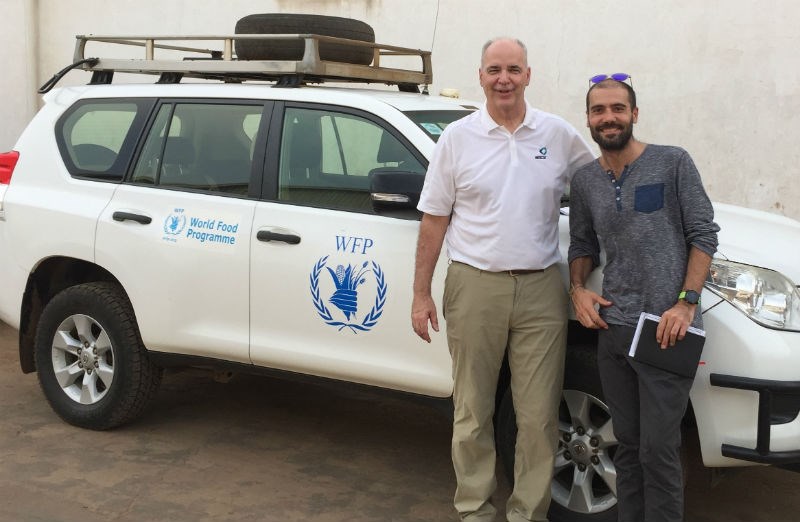On the supply route to saving lives: Amcor helps WFP in Africa
Sustainability
December 20, 2017Reading time: 2 minutes
Getting vegetable oil to people who are in urgent need saves lives. And those people are being reached in greater numbers because of collaboration between global packaging leader Amcor and the United Nations World Food Programme (WFP).
Getting vegetable oil to people who are in urgent need saves lives. And those people are being reached in greater numbers because of collaboration between global packaging leader Amcor and the United Nations World Food Programme (WFP).

Vegetable oil is a staple of the WFP’s food-aid distribution. Fortified with vitamins, the oil provides people in impoverished regions with vital nutrition and promotes growth in babies and children. It is an ingredient for cooking and an essential component of healthy food preparation methods such as sautéing and frying.
Dennis Kittel is one of several Amcor experts who have travelled on WFP missions. In November, he journeyed 9,000 kilometres from Manchester, Mic., in the United States to the WFP front line in Africa to see first-hand the programme’s challenging supply route.
Kittel, a packaging engineer with nearly 30 years of experience, started the week-long journey in Lomé, Togo, where he saw how so-called “jerrycans” of vegetable oil are received on ships and stored at the port and in WFP’s portside warehouse. The five-litre, high-density polyethylene (HDPE) jerrycans are then transported by truck along a supply route to a distribution centre more than 1,000 kilometres away in Niamey, Niger. The cargo is then divided and transferred to refugee camps across Niger.
“Our focus is on improving the containers used to package the oil to cut down damage and loss of contents along the difficult supply route,” said Kittel.
The containers can be damaged by handling, among other ways; with no forklifts, loading is done by hand. At the port, Kittel saw cracks developing in some of containers – even before they endured bumpy roads and extreme temperatures on the backs of trucks.

“The oil is precious, so we want to get as much of it as possible to people who need it most, and we can do this in surprisingly effective and low-cost ways,” he said. “Simply enhancing the packaging specifications from WFP could drive down oil leakage by half,” he said.
In addition to rudimentary “drop tests” – where full containers fall to the ground to gauge resilience – Amcor identified that calcium carbonate and clay fillers were making the jerrycans brittle and changing their density.
From Lomé, Amcor’s Kittel travelled to WFP’s distribution centre in Niamey, where he conducted further tests on the packaging. He noted the same labour-intensive methods for receiving and storing the goods, contributing to foil-seal failures and other damage.

Back at the lab
Now back from the mission to Africa, Kittel and his team of packaging experts are developing ways to further strengthen the packaging to better tolerate transportation and be more easily distributed to beneficiaries.
Kittel is among Amcor colleagues around the globe who are working to enhance WFP packaging. Laurie Goetz, director of technical services at Amcor Rigid Plastics, journeyed to Kenya in July, also to investigate and identify enhancements to packaging for vegetable oil. In Europe, colleagues from Amcor’s flexible packaging business have improved how children’s supplements are packaged and are developing better containers for high-energy biscuits.
About the partnership
WFP is a leading humanitarian organization dedicated to fighting hunger worldwide, delivering food assistance in emergencies and working with communities to improve nutrition and build resilience. Amcor has been a partner of WFP for several years, with the company’s experts involved in a variety of projects to further improv the effectiveness of rigid and flexible plastic packaging for WFP’s life-saving missions.
Amcor is also providing resources and expertise to the Ellen MacArthur Foundation’s New Plastics Economy initiative to increase the recovery and recycling of plastic packaging, and has a longstanding partnership with the Ocean Conservancy to reduce plastic packaging from entering oceans.
Find out more about Amcor’s sustainability leadership: www.sustainability-review.amcor.com
